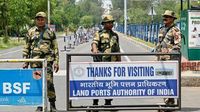On May 6, 2025, India executed missile strikes against nine sites in Pakistan that it claimed housed "terrorist infrastructures," marking a significant escalation in the long-standing tensions between the two nuclear-armed neighbors. This military action was announced by the Indian government as a retaliatory measure for an attack that occurred on April 22 in Indian-administered Kashmir, which resulted in the deaths of 26 individuals.
The operation, dubbed "Operation Sindoor," was characterized by the Indian government as a targeted strike aimed at facilities from which terrorist activities against India were allegedly orchestrated. The Indian armed forces declared that their actions were measured and designed to avoid further escalation, asserting that no Pakistani military installations were targeted during the operation.
According to the Pakistani army, the Indian strikes took place in three regions: two cities in Pakistani Kashmir and one in Punjab. The Pakistani military reported that eight civilians were killed in these airstrikes, including a three-year-old girl in a mosque in Bahawalpur, while 35 others sustained injuries. In response, Pakistan's Defense Minister Khawaja Asif condemned the strikes, claiming that all targeted sites were civilian, and announced that Pakistan would convene its National Security Committee to discuss the situation.
The backdrop to this military action was the deadly assault on April 22, when armed gunmen opened fire on a group of tourists in Pahalgam, a popular destination in Indian Kashmir, killing 25 Indians and one Nepalese. Although no group has claimed responsibility for the attack, Indian authorities have pointed fingers at Pakistan, alleging that at least two Pakistani nationals were involved and linked to the militant group Lashkar-e-Taiba (LeT), which has been implicated in previous attacks, including the 2008 Mumbai attacks.
The Indian government has maintained that its military response was necessary to hold accountable those responsible for the Pahalgam attack. In a statement, the Indian military emphasized, "Our action is targeted, measured and aims to avoid any escalation. No Pakistani military installations were targeted." This assertion of restraint is critical, considering the historical context of conflicts between India and Pakistan, particularly in the Kashmir region, which both countries claim in full but administer in part.
In the wake of the strikes, tensions in Kashmir heightened, with reports of heavy artillery fire exchanged across the Line of Control. The Pakistani army stated it would retaliate at a time of its choosing, with Lieutenant-General Ahmed Chaudhry, a spokesperson for the Pakistani military, warning, "We will respond when we choose." This statement underscores the precarious situation, as both nations have nuclear capabilities, raising concerns about the potential for a larger military confrontation.
Global reactions to the escalation have been swift. U.S. President Donald Trump expressed hope that the clashes would cease quickly, acknowledging the long history of conflict between the two nations. Meanwhile, the United Nations has urged both countries to avoid a military confrontation, with Secretary-General Antonio Guterres stating that the world cannot afford such a conflict.
As the situation develops, the Indian military has accused Pakistan of violating ceasefire agreements by firing artillery into Indian territory, specifically in the Bhimber Gali and Poonch-Rajouri sectors. India has vowed to respond appropriately to these provocations. The ongoing military exchanges have led to a climate of fear and uncertainty among civilians in both nations, particularly in border areas.
Moreover, the Indian government has indicated that it has informed the United States about its military operations, reflecting the strategic alliances and geopolitical dynamics at play in South Asia. The Indian police have also intensified their investigations into the April 22 attack, searching for additional suspects believed to be linked to the LeT.
In a further escalation of tensions, India has threatened to cut off water supplies to Pakistan, citing the need for accountability following the April attack. This threat comes in the context of a water-sharing treaty signed in 1960, which has been a point of contention between the two countries.
As both nations prepare for potential further military actions, civil defense exercises are scheduled in India to prepare the population for possible attacks. The situation remains fluid, with each side accusing the other of aggression and violations.
In summary, the recent missile strikes by India against Pakistan represent a significant escalation in a conflict that has simmered for decades. With both nations on high alert and the international community closely monitoring the situation, the potential for further violence looms large. As the world watches, the call for restraint and diplomacy becomes ever more urgent, with hopes that a peaceful resolution can be achieved before the situation deteriorates further.






